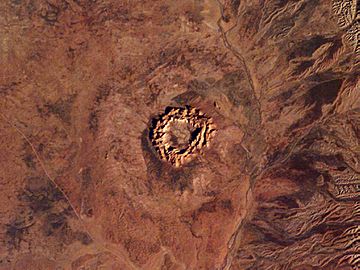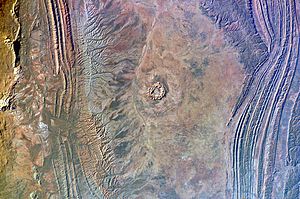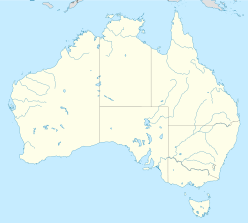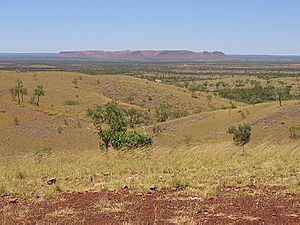Gosses Bluff crater facts for kids
| Tnorala | |

View of Gosses Bluff crater
|
|
| Impact crater/structure | |
|---|---|
| Confidence | Confirmed |
| Diameter | 22 km (14 mi) |
| Age | 142.5 ± 0.8 Ma Early Cretaceous |
| Exposed | Yes |
| Drilled | Yes |
| Location | |
| Location | Namatjira |
| Coordinates | 23°49′15″S 132°18′28″E / 23.82083°S 132.30778°E |
| Country | Australia |
| State | Northern Territory |
| Municipality | MacDonnell Region |
Gosses Bluff is a huge, ancient crater in Australia. It's also known as Tnorala to the local Western Arrernte Aboriginal people. You can find it in the middle of Australia, in the southern Northern Territory. It's about 175 km (109 mi) west of Alice Springs. Explorer Ernest Giles named it in 1872.
How Gosses Bluff Crater Was Formed

About 142.5 million years ago, a giant space rock, like an asteroid or comet, crashed into Earth here. This happened during a time called the Early Cretaceous period. The original crater was very wide, about 22 km (14 mi) across.
Over millions of years, wind and rain have worn away most of the original crater. What we see today is a 5 km (3.1 mi) wide, 180 m (590 ft) high circular hill. This hill is actually the center part of the crater that got pushed up when the space rock hit. Scientists first figured out it was an impact crater in the 1960s. They found special rocks called shatter cones, which only form from powerful impacts.
Cultural Stories of Tnorala
The Western Arrernte Aboriginal people call this place Tnorala, and it is very sacred to them. It is now part of the Tnorala Conservation Reserve. They have a special story from the Dreamtime about how it was made.
In the Dreamtime, a group of sky women were dancing as stars in the Milky Way. One of the women got tired and put her baby in a wooden basket, called a "turna." As they kept dancing, the basket fell from the sky and crashed into the Earth. The baby fell out and pushed the ground up, forming the circular mountains we see today. The baby's parents, the evening and morning stars, are still looking for their baby in the sky. You can see the "turna" basket in the sky as the constellation Corona Australis.
 | Aaron Henry |
 | T. R. M. Howard |
 | Jesse Jackson |



